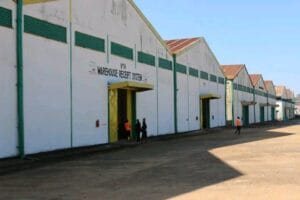Recent reports have raised concerns over the distribution process of subsidized fertilizers at the Kitale National Cereals and Produce Board (NCPB) depot.
A visit to the depot has uncovered a troubling discrepancy between what staff communicated to farmers and what was happening behind the scenes.
On a visit to purchase four bags of Yara CAN and UREA fertilizer, a farmer tells us he was informed by a staff member that the fertilizers were out of stock, despite recent reports indicating their availability.
However, a walk over to the loading area revealed large quantities of the same fertilizers being actively loaded onto trucks, suggesting that they were indeed in stock.
When the farmer returned to question the staff member about the discrepancy, the response was evasive and dismissive, sparking concerns about the fairness of the distribution process.

The incident raises serious questions about the transparency of the fertilizer distribution process and whether ordinary farmers are being unfairly turned away while larger allocations may be taking place behind the scenes.
“Hi, Nyakundi. On a recent visit to the Kitale NCPB depot to purchase four bags of subsidized Yara CAN and UREA fertilizer, I was informed by a staff member that the fertilizers were out of stock. This struck me as unusual given recent reports of availability, so I decided to investigate further on my own.
I walked over to the loading area, and to my surprise, I witnessed loaders actively loading large quantities of the same Yara CAN and urea fertilizers onto trucks. The activity appeared organized and busy, clearly indicating that the fertilizers were indeed available, contrary to what I had been told.
Determined to get clarity, I returned to confront the staff member who had earlier claimed the fertilizers were unavailable. Visibly caught off guard, she appeared shocked and called over a colleague for assistance.
However, instead of addressing my concern, the colleague dismissed the situation, saying, “Let him go.” This encounter left me with serious concerns about transparency and fairness in the distribution of subsidized fertilizers.
It appears that while ordinary farmers are being turned away, large-scale allocations may be happening behind the scenes—possibly pointing to the presence of cartels or favoritism within the distribution system.”